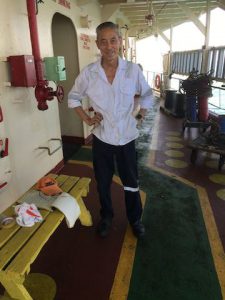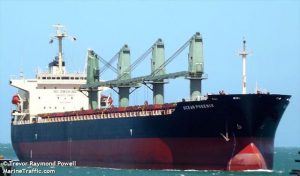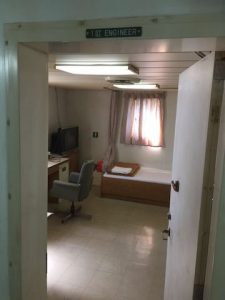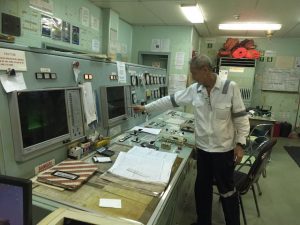Coming out of retirement
Patrick Tay got a calling to go back to the sea as a marine engineer after staying away for 35 years. However, it was a short stint and he is looking for his next adventure.
BY: Eleanor Yap
Retiring for only 10 months after working with the Navy and subsequently as an engine supplier, 67-year-old Patrick Tay chose to go back to work as a marine engineer, a job he left 35 years ago. He explained: “I still have the energy to do it and also there is a shortage of marine engineers. I thought it would be difficult to get a job after retirement age but I did get a job. I feel like a pioneer.”
Patrick sailed on the Ocean Phoenix in July from Australia and was set to stay on for six months. He even celebrated his birthday in August “quietly” on board. However, things were not meant to be and he resigned in early September but he is still very open to returning to the sea.
Ageless Online finds out more from the father of two about what it was like getting back onto the saddle for that short time:
I understand you were sailing for over 10 years and sailed to places like China and America. Can you tell me more and why you left?
I sailed from 1969 to 1980 and started out as a cadet and then rose to the ranks of second engineer. I left as I was getting home sick, love sick (I was at the time looking for love and at sea we have no chance to contact the opposite sex) and seasick. I felt that I would miss out on my social life if I didn’t quit the sea.
So why did you return to the sea?
I wanted to see what life was like after 35 years of being grounded. I also wanted to challenge myself psychologically and work-wise. I have yet to overcome my three earlier sicknesses but I felt at sea I might be able to deal with them. After I retired, I have been keeping fit psychologically and mentally, and I wanted to put them to the test.
The other reason for returning to work is financial. I need to earn more because I will be living longer.
Was it easy finding the job?
I attended social functions and asked people in the shipping companies. When I attended one function organised by the Singapore Shipping Association, I met the CEO of Apex Ship Management, who is also an ex-Navy man like myself. That’s how the contact was established. From then, I called him up and he told me to send my CV. That was the beginning of my new sea life. Although there is a shortage of marine engineers, one still has to put in the effort to look for opportunities.
For my CV part, I got a lecturer friend to look through it and I sent over the updated copy.
How was it working with younger colleagues and possibly a different environment from the one you left years ago?
I was working with an Indonesian crew, with the captain being from Myanmar. They were mostly younger men, except for an oiler who was 50+. At first, the cadet tried to do things for me but after I insisted on doing things myself, he left me alone. Otherwise, it is no different from working with people of my own age.
Also, it was tough especially having to learn almost everything from scratch. Engines are not the same after 35 years. People are also not the same. The work culture has changed – now the three oilers keep independent watches and help the engineers in repair work; previously it wasn’t like this. There are 10 persons in the engine room. We had to keep watch and also do day work for about two hours.
On top of that, there are a lot of reports nowadays to submit to the head office.
Any other challenges?
As I said earlier there was a lot of things to learn as I left the marine profession 35 years ago. Before getting back to the sea, I had to spend a lot of time reading and asking friends for help.
Another challenge was working with a foreign crew. I needed to learn the cultures and the way of doing things. The best change on board was of course the telecoms connection where we could make calls (I mostly used Whatsapp), but we still needed to wait till we got to port to surf the Net.
We had to do watch-keeping and added in some overtime to do day work. Whenever there was an emergency, everyone had to stay awake. We easily exceeded the eight-hour work rule and I also got sleepy and sometimes fell asleep sitting down.
You still get seasick. Can you tell me more?
I used to get seasick in my younger days. Since I realised my weakness early on, I have been doing regular fitness training such as running and eating a proper diet for the last 35 years. I also had been going for head massages at the hair treatment centre regularly for the past three years where they make you lie down on a low pillow for about 45 minutes and do a light massage on your head. Initially, I felt uncomfortable but I think it helped to improve the head’s blood circulation!
How many countries did you go to while on board?
In July, I joined the ship in Townsville, Queensland, and have gone to Jakarta, Singapore and back to Australia. We picked up coal from Australia to Indonesia and travelled back to Australia empty. The port was very far from town so all of us had to stay on board. We only went ashore and did some shopping in Jakarta in a port called Cigadin. However, I would go with some of the Indonesian crew as the chief officer said to me it could get dangerous for a foreigner to go out alone.
The first thing I bought there was a SIM card with 4GB of data as it costs me S$7 and it would last six months.
Any interesting moments on board?
I remembered the first day I stepped on board, it was also the same day the Australian Port State Control came on board to conduct spot checks. These checks are to determine if the ship is sea-worthy. If the ship is found to have major faults on board, they have the power to detain the ship. At the end of the inspection, the inspector came up with a list of items that needed attention. One of them was the self-closing doors. The doors are supposed to close automatically but some were not. These doors had not been maintained for years and we don’t have spares as they are old models.
I was given the task to rectify all the self-closing doors. We tried all we could and one door just wouldn’t close. Time was running out also as the Maritime Authority of Singapore, who oversees all Singapore registered ships, ordered a special survey in Jakarta, where we would dock later. In Jakarta, there was a change in crew and the new bosun (officer in charge of equipment and the crew) was tasked to do this job. He seemed to be experienced with these doors. I watched him do a few doors and figured what I needed was oil to fix the mechanism and hoping that it might work. We did just that and thank God the door closed and it was just one day before the surveyor was to come. You can imagine the huge relief I felt!
What’s your typical day like?
At sea, I kept watch (this entails staying in the engine room, monitoring the machineries and attending to anything unforeseen such as if the temperature suddenly shoots up) from 4am to 8am. After breakfast at about 9am, I would go down to supervise work till about 11am. After lunch, I would rest till 4pm, and then I do watch-keeping again till 8pm. After which, I would go to bed. The next day would begin the same routine. If there were any emergencies or breakdowns, we had to stay awake till it got fixed.
In port, we did not keep watch but we would do day work (which entails repair or modification works) for example from 8am to 5pm. We would not get a day off when we were watch-keeping. Our day off only came when we would do day work and if it fell on a Saturday, we would work till 12pm and get Sunday off. This was rare as most of the time we were at sea.
When we arrived at the home port for the Indonesian crew, we had to do all the necessary work first before we could go ashore. The chief was kind enough to let the crew off for short leave; it was quite flexible.
Did you regret coming back? Also, what were your motivations?
There are times of regret when I encountered difficult problems. Then I would say to myself maybe I should retire at the end of the contract. But when I was still there, I had to provide service to people. One way I motivated myself was to do the tough things first and the normal things would then become easy. I practised this technique when I was ashore and retired. I ran, disciplined myself and controlled my diet. That was how I got through my retirement days. I know of a colleague who retired from work and went through two depressions because he had nothing to do. He had to be on medication for anxiety. He tried to initially cope on his own but eventually realised he needed medical assistance.
The other way I motivated myself was to treat the machineries like patients in a hospital. Every now and then, some of the machineries would call out for attention and we had to attend to them. Each machinery must be given the time and attention just like patients. We would monitor the temperatures and pressures, etc, regularly to make sure they were within tolerances. I felt like a nurse or helper in Singapore. They always have to take care of others at the expense of themselves. I now have a better appreciation of foreign workers after this experience. As it is, I was the only Singaporean surrounded by an Indonesian crew.
Anything of Singapore that you missed most while you were away?
The convenience of home, familiar routines and faces like my wife and family, etc, and Internet access. On the ship, I was not in control. We are not the ones deciding where we would go or what we would do. We would do it because things needed to be done whether we liked it or not.
I also missed the food of my choice such as fruits and vegetables. Surprisingly, I didn’t miss the newspapers although I had been reading them daily while I was in Singapore.
How does your family feel about your decision to come out of retirement?
Though my wife didn’t want me to leave, she nonetheless supported my decision. My children didn’t say anything. The good thing about leaving Singapore was that my wife had to learn how to use Whatsapp for the first time. She has been talking more to the children on how to use the Internet.
I understand you have resigned. Why did you do so?
I left because there were a lot of new components to learn and I had to spend a lot of time reading the manuals to understand how to overhaul them. I realised there was a knowledge gap and so there was no point for me to remain on the ship.
Will you be looking at going back out to the sea?
If the opportunity arises why not, but I have to be careful not to jump into it. If the ship is old and has old machineries, then it would suit me. If not, I will need to get the necessary training before I go on board again. At the moment there is no course on practical overhauling work so I just have to think of something else to do.







0 Comments